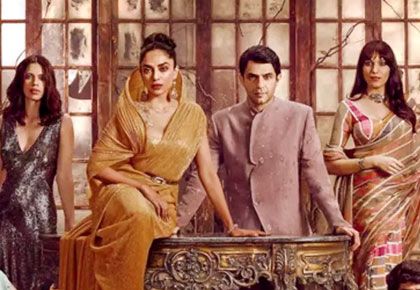Clubbing in multiple weddings in one go dilutes some of the conversation.
Conflicts are resolved too neatly and grey areas of complicated equations are left on a note of ambiguity, observes Sukanya Verma after watching the second season of Made in Heaven.

Returning to a season full of weddings after surviving the pandemic makes the survival instincts and festive gusto of its characters even more human. Whether or not Made in Heaven's new season is meant to be viewed in COVID-19's aftermath, the shift in our psyche has quietly happened.
Sometimes it's too much to handle.
Sometimes it's imperative to put one's foot down.
Sometimes you have to go for broke.
No one understands what it's like to be in a constant flux more than the creations of showrunners Zoya Akhtar and Reema Kagti's sumptuous, sensitive Web series about messy realities and magical weddings.
When a decision is mistaken for an occasion, it's called a wedding. Only this big day in two people's lives is also the time of great uncertainty where how one feels becomes as relevant as their family.
Made in Heaven's greatest charm lies in looking at this short-term existential crisis among the affluent with cheek and cynicism while highlighting society's meddlesome role and flawed norms.
What gives it depth and perspective is the team engaged behind-the-scenes, the wedding planners Tara (Sobhita Dhulipala) and Karan (Arjun Mathur), Jazz (Shivani Raghuvanshi) and Kabir (Shashank Arora) and two new additions, Bulbulji (Mona Singh) and Mehr (Trinetra Haldar), pulling some strings and leaving no stone unturned to take some of the load off their client's shoulders and ensure their dream nuptials happen without any glitches.
It's the fight after the fairy tale nobody can be prepared for.
Made in Heaven looks beyond the fancy scale and chaotic business of dysfunctional Delhi shaadis to document the professionals hard at work turning plans into performance. Commitment to their job is their undisputed virtue even if they battle on the personal front.
Tara's failed marriage to Adil (Jim Sarbh) and betrayal by BFF Faiza (Kalki Koechlin) may not have hurt those born into privilege, but amplifies Tara's humiliation and history as a social climber. (Her consolation prize is a fetching love interest in Chef Raghav, played by the super smiley Ishwak Singh.)
Karan's strained mother-son ties over his sexuality show no signs of improvement, pushing him towards dangerous extremes of drug dependency.
Jazz's roots are too firmly planted into the fringes to escape the harsh sting of elitism.
Kabir's frustrations over a father who doesn't get his creativity overshadows the joy of a studio that does.
There's more to Bulbul (Tara and Karan's prudent new auditor and financier Jauhari's -- played by Vijay Raaz -- better half) than meets the eye as she educates her adolescent sons on slut-shaming and consent.
But it's the cruel scrutiny and repeated disappointment Mehr experiences on a regular basis as a trans woman, which capture a fraction of the LGBTQIA+ community's everyday struggle.
Made in Heaven is a collection of fine performances.
The leads are in excellent form -- a sleek, volatile Sobhita, an uninhibited Arjun, a compelling Mona and watchful, poised Trinetra, Jim Sarbh acing it as usual while the likes of Neelam, Dia Mirza, Radhika Apte and Sarah-Jane Dias do their bit to infuse drama and emotions.
If season one introduced us to Tara and Karan's personality, past and present, season two takes the familiarity and friendship for granted and moves on almost as if saying the show must go on, life will follow.
What comes forth is often languid and low on revelation yet almost life-like in its limbos and prolonged spells of indecision.
Zoya Akhtar and Reema Kagti's film-making is a striking combination of thought and aesthetic. Along with co-directors Nitya Mehra, Alankrita Shrivastava and Neeraj Ghaywan, they examine the ugly prejudices camouflaged under the pretty imagery, sometimes a tad too self-righteously.
A constant obsession with fair complexion, the unfair practice of polygamy, treating age difference as an issue only when the older one is a woman, treatment of Dalits in an inter-caste match, tolerant brides of abusive beasts, lesbian weddings, second marriages, PR-orchestrated celebrity marriages (featuring Anurag Kashyap in a comical cameo and Pulkrit Samrat revisiting his role, this time in the groom's shoes), it's all addressed -- either in fascinating detail or annoying hurry.
Though two episodes less than last season, clubbing in multiple weddings in one go dilutes some of the conversation.
Quite a few characters, even the charismatic ones, appear to be around only for the sake of continuity.
Conflicts are resolved too neatly and grey areas of complicated equations are left on a note of ambiguity.
What's incredible though is how harmonious the collaboration seems when the interpersonal stories advance.
Zoya's witty flourishes, Reema's poetic spunk, Nitya's blend of feeling and elegance, Alankrita's ballsy touches, the women are in perfect sync as usual. But Neeraj Ghaywan's seamless understanding of Made in Heaven's world and individual vision in his refusal to see morality as a moot point when a pair of parents-in-law fall in love or honesty to recognise the friction within the marginalised themselves make him a welcome (if not surprising if you remember Geeli Puchi) addition.
Once again though, it's not the sight of designer lehengas displayed in Sabyasachi's exquisite studio, impeccably laid out exclusive crockery, perfectly poured in pink champagne tower or handpicked exotic flowers flowing out from every corner of a destination wedding in the French Riviera but the simple satisfaction of a ceremony done right when a bride and groom make an informed decision that empowers Made in Heaven's beliefs.
Made in Heaven 2 streams on Amazon Prime Video.

- MOVIE REVIEWS

